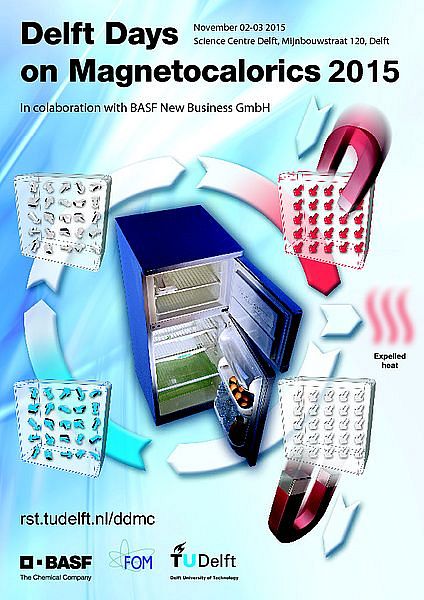During the Delft Days on Magnetocalorics (November 2-3, 2015) participants will see a prototype refrigerator and a waste heat generator. “It’s just the beginning,” says organiser Ekkes Brück.
Some 130 researchers from universities, research institutes and companies all over the world have come to Delft for the Delft Days on Magnetocalorics (DDMC). The fourth edition of the biannual conference is the most applied so far. What began as a weird behaviour of some materials has now reached the stage of the first prototypes.
Magnetic cooling, based on the magnetocaloric effect, is the phenomenon that some materials heat up in a magnetic field, lose thermal energy to the environment and exit the field cooler than when they entered. Although it was discovered almost 100 years ago, its use has long been reserved for extreme cryogenic cooling. Only recently, initiatives have spawned to develop magnetic fridges that promise to be silent and environmentally friendly.
Professor Ekkes Brück from the Faculty of Applied Sciences, who co-organised the event with sponsor BASF and the Dutch foundation for material research FOM, has scheduled Patrick Corey from the University of Applied Sciences of Northwest Switzerland to give the opening. Corey will present a unique magnetocaloric generator that converts waste heat at 80 degrees Celsius to electric power. As yet, the efficiency is unknown, and the power output is modest (with a 1-kilowatt generator). But the development of converting industrial waste heat into electricity is interesting enough.
Another remarkable prototype is the BASF magnetic refrigerator, to be presented by Olaf Rogge on Monday afternoon. Although the device itself will not be present, the audience will learn about the 30-degree temperature span that it can bridge. The main advantage of magnetic cooling is the absence of chemical coolant gases, many of which are toxic or ozone depleting. A magnetic fridge works with (salt) water for heat transport and is simpler in construction. So far, however, they are less energy efficient than the current domestic refrigerators.
Meanwhile, fundamental research into more powerful magnetocaloric materials continues. Three PhD students from Professor Brück will present their findings. H. Yibole will present ‘Recent developments in (Mn,Fe)2(P,Si) materials. X.F. Miao will talk about ‘Kinetic-arrest induced phase coexistence and metastability in (Mn,Fe)2(P,Si)’ and M. Boeije will shed light on ‘first-order magnetostructural transitions’. And those are just the titles of their talks.
“A conference like this is an important platform for them,” says Brück. “It can significantly boost their chances for a post-doc position elsewhere.”



Comments are closed.